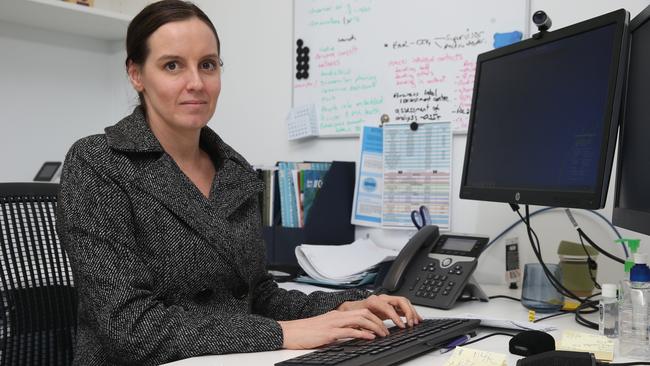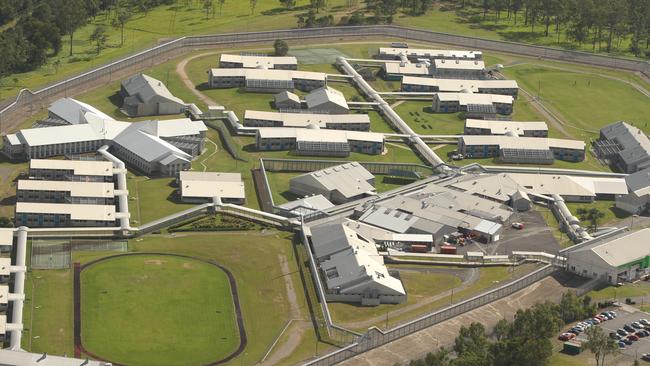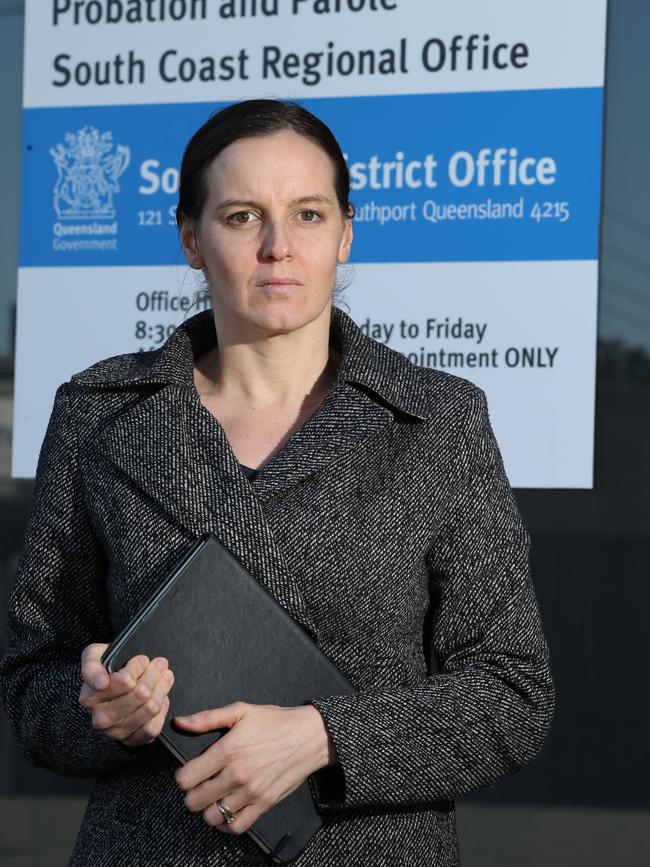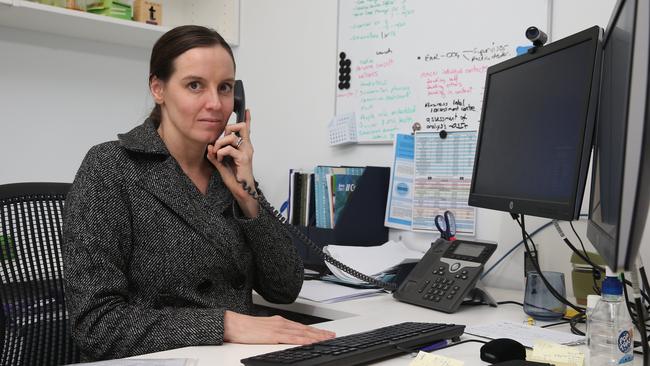It’s the parolee whose case Peta-Ann Clark is reviewing. But it’s the woman beside him she’s about to free.
Maybe it’s something in the notes that triggers her attention, maybe it’s a visible bruise she’s spotted, but she alerts her co-workers at Southport Probation and Parole … and the action is immediate.
Quietly, calmly, the woman is walked through the back door of the Scarborough Street office and into the arms of the domestic violence organisation that will now protect her.
It’s just another day at the office for Peta, acting regional manager of Queensland Corrective Services’ South Coast community corrections.
‘CONFINED, DIRTY AND OVERCROWDED’: ARTHUR GORRIE CORRECTIONAL CENTRE

With a district that covers Burleigh, Southport, Logan and Beenleigh, Peta is responsible for more offenders than any other district in Queensland.
Although police might be recognised as the thin blue line protecting our city, the border of safety created by community corrections is so faint you can barely see it … but you can feel it.
THE INTERVIEW: TRACEY MARAIS OF CONDEV
“Sometimes I think our community corrections officers are heroes,” says the mother of two daughters.
“I know we’re not viewed in the same light as the police, ambulance and fire services, but we’re on the frontline as well. People just don’t realise it.
“We don’t wear uniforms and people don’t really know what we do, but we walk that tightrope of constantly monitoring, assessing and balancing the risk for the greater good. It’s a balance between offender rehabilitation and community safety, and we walk that line in between to keep others safe.
“There is a real risk in this job, your clientele are offenders. But we have stringent security systems in place. We have assessments and screenings to indicate the level of risk, but sometimes you do just have to trust your gut.
STRESS ON PRISON SYSTEMS TO BLAME FOR HINTERLAND JAILBREAKS

“There is no exact science when you’re dealing with human behaviour and there is a lot of pressure to get that balance right. Our officers take community safety so seriously. We work hand-in-hand with other groups, that’s why we’re not just evaluating the offenders but their partners and their families too. The more we look after their safety, the safer our community is.”
Peta says there are about 21,000 offenders on supervision orders in Queensland, compared to about 8000 in custody.
Her department looks after offenders on community service orders, probation and parole, and regularly undertakes risk assessments to co-ordinate programs, regulate activities, conduct breath and urine testing, and liaise with health experts.
“With community service orders, we co-ordinate and manage and assess them and match them with not-for-profit groups where they can work off their hours and give back to the community. The community benefits from the service, the offenders learn new skills and the organisations benefit from a helping hand,” she says.
SUBSCRIBE TO THE BULLETIN FOR $1 A WEEK FOR THE FIRST 12 WEEKS

“Other individuals we see are on probation or parole; some of them are young people who have made wrong decisions, or are under the influence of drugs, or are trapped in an intergenerational offending pattern. Some of them have chosen to be on the wrong side of the track, some of them don’t even know what the right side of the track is.
“We do our best to help them find the right track and stay on it. But it’s not always successful. That’s when we have to raise issues with parole boards and courts and possibly recommend a return to a custodial sentence.
“It’s not something we shy away from. Community safety is first and foremost. Yes, it can be sad to see that your hard work hasn’t worked, but that’s reality.”
OTHER NEWS:
Dozens of employees fired from aged care home
Untold story of Michael Yarwood’s final months

After 17 years working for Queensland Corrective Services, Peta says she is not jaded, despite research that shows about 42 per cent of prisoners released into the community will be back in custody or under community supervision within two years.
She is immensely proud of her team, many of whom are women who work against the odds to make a difference. In fact, the Queensland recidivism rate is lower than the national average.
“I have this earnest belief in equality and so many of these offenders have not had an equal chance at a ‘good’ life,” she says.
“I’m not making excuses but establishing facts. Yes, many of these people have made a choice to commit a crime and anyone who does commit a crime must be subject to the consequences.
SIX HOSPITALISED FOR SUSPECTED OVERDOSES AT QLD CORRECTIONAL CENTRE
“However, what I see so often is that so many offenders come from families where generation upon generation have been in and out of prison, they don’t know which way is up. They’ve grown up with huge disadvantages or have been victims of crime or abuse themselves. No, it’s not an excuse, but it is a reason to give them my time and my help.
“We do see wins along the way, it gives you hope and fuel to keep going. Maybe it’s the first time someone has actually completed their community services hours, or they say they can see that they need to change their life path for the sake of their own children. This happens and changes not just their life but has a ripple effect on the whole community.
“I use the metaphor that we’re trying to turn a big ship. It’s not quick and it’s not easy. We have to lay that groundwork to get people moving in a new direction.
“So many of us in this job are wives and mothers — and some great men too — but community corrections has historically been female-dominated. I think it helps that we have soft hearts but nerves of steel.

“At the heart of this job is that we make it a priority to remember that every case is a person. They have their own history, their own problems, their own dreams and their own rights. It’s not black and white, it’s not good or bad.
“As a society we’ve become so focused on external judgment that we lose focus of the humanity. The beauty of our job is that the judging is literally done by the judge. It’s our job to work on change.”
Peta’s optimism comes despite recent criticism of the criminal justice system.
Just last week, Gold Coast magistrate Brian Kucks said in Southport Magistrates Court that convicted criminals were dodging jail after breaching their parole terms because the prisons were overflowing.
Mr Kucks said it appeared that probation and parole officers were reluctant to record a parole breach for criminals who had committed another crime, in order to keep them out of jail.
However, QCS says community corrections officers do not decide to return offenders to court, as that is a matter for Parole Board Queensland. Instead, officers make risk-based assessments and provide advice to PBQ, which decides whether to “breach’’ someone.
Meanwhile, the Queensland Productivity Commission is preparing to release its final report for its inquiry into imprisonment and recidivism, with the draft report highlighting both crowded jail conditions and the importance of community corrections as an alternative.
The QPC draft report shows imprisonment rates are rising, despite falls in crime rates, and that there is little evidence increasing use of imprisonment benefits the community. But it also states “limited resourcing is provided to support the supervision of offenders in the community’’.
SUBSCRIBE TO THE BULLETIN FOR $1 A WEEK FOR THE FIRST 12 WEEKS
“Queensland expenditures on community supervision are the lowest in Australia and Queensland has the highest ratio of offenders to community corrections staff,” the draft report says.
“Although 70 per cent of individuals being supervised by QCS are under a form of community corrections order, this cohort attracts only 10 per cent of the corrections budget (the rest is spent on prisons).”
However, Peta says it is once again a case of trying to turn around a big ship.
“I can’t speak directly to Mr Kucks’s comments,” says Peta.
“But we actually received a big injection in both funding and positions a few years ago, when the Parole System Review was released.
“It takes time for changes to occur. The criminal justice system is another big ship and our department is at the very end of it, so we’re the last to swing around. More funding and more positions would always be wonderful, but I think we have a really dynamic, dedicated team.
“Yes, we have very high offender numbers, but we also have a high number of very skilled staff. Beyond that, we have very important relationships with community partners — police, psychiatrists, intervention programs.
“We’re a leader in the collaboration space, we have the connections to focus on both the rehabilitation of our offenders but also to support and inform our partners who protect the victims.
“Domestic violence is a powerful example of these partnerships in action. We can help the offender who walks through the front door, but we can also help their partner by showing them through the back door.”
Peta says while her non-uniformed staff might not receive the public recognition of other frontline services, that’s not their focus. In fact, perhaps invisibility is just part of their superhero powers.


Add your comment to this story
To join the conversation, please log in. Don't have an account? Register
Join the conversation, you are commenting as Logout
Sharks unveil huge new stadium, $500m mega development
Southport Sharks has unveiled plans for a near-21,000-seat stadium and three residential towers in a massive redevelopment that could reshape the Gold Coast's sporting landscape.
Revealed: All Coast’s options for solving gridlock nightmare
The Gold Coast's population will surge by 350,000 in two decades, but the city's transport blueprint remains in limbo after light rail's dramatic cancellation. FIND OUT MORE